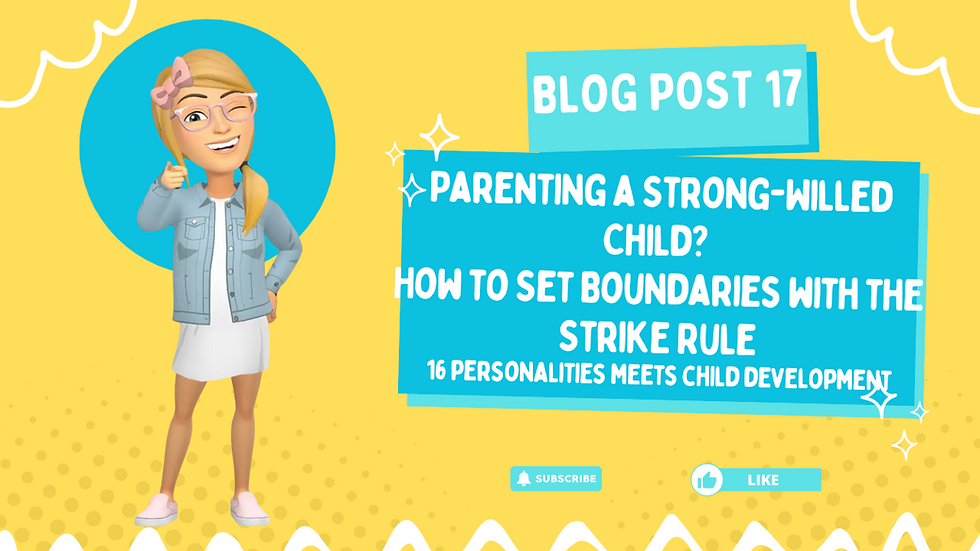3 F’s to Reset Your Dysregulated Home | Food, Fresh Air & Fun Parenting Hack | Blog Post 18
- MindChild Institute
- Jul 20, 2025
- 3 min read
Sometimes the mood in the house feels off. Everyone’s cranky. The meltdowns are piling up. You're either yelling or zoning out — and the kids aren't doing much better. When dysregulation creeps into your home, it’s easy to start spiraling into more rules, more punishment, more frustration.
But before you try to out-discipline the chaos, try the reset button: Food, Fresh Air, and Fun.
It sounds simple — maybe even too simple — but these three F’s are grounded in neuroscience, connection, and developmental needs. When used intentionally, they can help restore balance in even the most chaotic of homes.
1. Food: Fueling Regulation
Let’s start with the basics: a hungry brain is a dysregulated brain.
Low blood sugar, dehydration, and nutrient imbalances all impact mood, impulse control, and emotional resilience. Ever seen a toddler tantrum at 4 p.m.? Yeah, that’s usually a snack issue.
But food is more than just fuel — it’s connection. Sharing a snack, cooking together, or even offering a warm drink can regulate the nervous system. Why? Because food is linked to attachment. From infancy on, feeding is one of the first forms of safety and love. When done with intention, food becomes comfort, routine, and a bridge to re-connection.
Try This:
Offer fruit and protein instead of sugary snacks.
Cook a simple meal together.
Create a “reset snack” tradition when tension starts building.
2. Fresh Air: Regulating Through Movement and Nature
Movement is a biological regulator — it calms the body and resets the mind. Add in sunlight and nature, and you’ve got the magic formula for a full sensory reset.
Even a 10-minute walk can bring everyone down a few notches emotionally. Physical activity releases endorphins and helps discharge pent-up energy (read: built-up stress and rage). For kids, who often don’t have the words to express their emotions, movement becomes a powerful outlet.
Try This:
Take a walk around the block.
Visit a park with your kids (yes, even if you don’t feel like it).
Let them climb, dig, or jump — unstructured movement is key.
3. Fun: The Fast Track to Connection
Play is not a luxury — it’s a neurodevelopmental necessity.
Play builds trust, reduces cortisol (stress hormone), and increases dopamine (feel-good chemical). When things get tense, we often stop playing, stop smiling, stop connecting. But that’s exactly when we need fun the most.
Engaging in fun — especially when it's child-led — sends a critical message: “You’re still loved, and I still enjoy being around you, even when things are hard.” That’s connection. And connection regulates.
Try This:
10 minutes of child-led play (even if you’re tired — set a timer).
A silly dance party to break tension.
Share inside jokes, play a board game, or do a simple craft.
The Neuroscience Behind the Reset
Bonding and co-regulation aren’t abstract ideas — they’re hardwired into our brains. When we engage in safe, shared experiences, our brains release oxytocin, the bonding hormone. This hormone lowers stress, increases trust, and builds the foundation for future emotional resilience.
Especially for children aged 0–7 (when much of their brain wiring is happening), repeated moments of co-regulation — like cooking together, taking a nature walk, or laughing during play — literally shape their capacity to handle stress, regulate emotions, and connect with others later in life.
You don’t need to be perfect. You just need to be present — and reset when needed.
Final Thoughts: Hit Reset Before You React
So the next time your household is falling apart and you're tempted to escalate — pause. Try the 3 F’s first.
Feed the body.Move the body.Connect through joy.
And watch the temperature in your home start to cool down — one bite, one breath of fresh air, and one belly laugh at a time.
More resources on the 16 personalities, child development, classroom management, and even structured literacy at: mindchild.net
Donate to our 501(c)(3) nonprofit to help children, parents, and educators access vital resources and trainings. Your generosity fuels our ongoing efforts to address the literacy and education crises through innovative programs and support. One day, with your help, we hope to build a fantastic school—until then, we’re dedicated to making meaningful change by empowering communities today.
DONATE NOW: https://www.mindchild.net/about-3-2



Comments